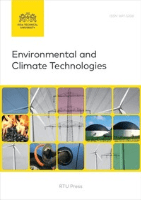
Environmental and Climate Technologies
Scope & Guideline
Exploring Frontiers in Environmental Science and Renewable Energy.
Introduction
Aims and Scopes
- Sustainable Energy Systems:
Research related to renewable energy sources, energy efficiency, and innovative technologies for energy production, such as solar, wind, and bioenergy systems. - Climate Change Mitigation:
Studies targeting the assessment and reduction of greenhouse gas emissions, including carbon capture, utilization, and storage technologies. - Waste Management and Circular Economy:
Exploration of waste recycling, resource recovery, and sustainable management practices to promote a circular economy. - Environmental Impact Assessment:
Evaluations of the environmental impacts of various technologies and practices, including life cycle assessments and sustainability evaluations. - Biotechnology and Bioeconomy:
Research focusing on the use of biological processes and materials in sustainable practices, including bioproduct development and biowaste utilization. - Urban Sustainability and Resilience:
Investigations into sustainable urban development, including energy-efficient buildings, smart city technologies, and urban infrastructure resilience. - Policy and Governance:
Analysis of environmental policies, regulations, and governance frameworks that influence sustainability practices and technologies.
Trending and Emerging
- Climate Resilience Technologies:
An increasing focus on technologies that enhance climate resilience, including adaptive infrastructure and systems designed to withstand climate impacts. - Decarbonization Strategies:
Research on strategies for reducing carbon footprints across various sectors, particularly in energy systems, transportation, and industrial processes. - Smart and Sustainable Urban Solutions:
Emerging studies on smart city technologies, including energy management systems, urban planning, and sustainable transportation solutions. - Bioproducts and Biowaste Utilization:
Growing interest in the development of bioproducts from waste materials and the application of biotechnology in environmental sustainability. - Integrated Energy Systems:
Research on hybrid and integrated energy systems that combine multiple renewable energy sources and innovative storage solutions for enhanced efficiency. - Policy Innovation and Governance:
An uptick in studies exploring innovative policy frameworks and governance models that facilitate sustainable practices and climate action. - Life Cycle Assessment and Circular Economy:
A trend towards comprehensive life cycle assessments that support circular economy initiatives, reflecting a holistic view of sustainability.
Declining or Waning
- Traditional Fossil Fuel Technologies:
Research related to fossil fuel extraction and utilization has decreased, reflecting a broader global shift towards renewable energy and sustainable alternatives. - Conventional Waste Management Practices:
Studies focusing on traditional waste disposal methods are less frequent, as there is a growing emphasis on innovative recycling and resource recovery approaches. - Single-Sector Analyses:
There is a noticeable decline in papers that focus solely on one sector's environmental impact, as interdisciplinary approaches and integrated analyses gain preference. - Basic Environmental Monitoring:
Basic studies on environmental monitoring without technological or innovative solutions are becoming less common as more applied research is favored. - Agricultural Practices without Sustainability Focus:
Research on traditional agricultural practices not linked to sustainability or climate resilience is decreasing, with more emphasis on sustainable agriculture initiatives.
Similar Journals

CT&F-Ciencia Tecnologia y Futuro
Advancing knowledge in chemical engineering and energy.CT&F-Ciencia Tecnologia y Futuro, a distinguished open-access journal published by ECOPETROL SA, serves as a vital platform for the dissemination of innovative research and advancements in the fields of chemical engineering, energy, fuel technology, and the broader disciplines within the geosciences. Established in 1996 and operating continuously until 2023, this bilingual journal aims to foster collaboration and knowledge exchange among researchers, professionals, and students in Colombia and beyond. With an increasing emphasis on sustainability and renewable energy, CT&F aligns with contemporary academic priorities and societal challenges. Although currently ranked in the Q4 category across multiple disciplines, the journal remains committed to enhancing its impact and accessibility, providing researchers with valuable insights and a significant forum to share their findings, all under the auspices of open-access since 2009. Explore a wealth of research as you contribute to the ongoing dialogue shaping the future of science and technology.

Green Energy & Environment
Exploring the Frontiers of Green Energy and Ecological Sustainability.Green Energy & Environment, published by KEAI PUBLISHING LTD, stands as a pioneering journal dedicated to the dynamic fields of renewable energy, sustainability, and environmental science. With its ISSN 2096-2797 and E-ISSN 2468-0257, this Q1 journal holds a noteworthy presence in academic discourse, reflecting its high-quality contributions within these critical areas of research. Launched in 2016, it has consistently embraced an Open Access model, facilitating unhindered access to research findings and fostering collaboration across global communities. Based in Beijing, China, this journal is dedicated to disseminating innovative insights that are essential for addressing urgent global challenges related to energy and environmental sustainability. Researchers, professionals, and students alike benefit from a platform that not only showcases pioneering research but also encourages interdisciplinary dialogue and knowledge exchange in the pursuit of a sustainable future.
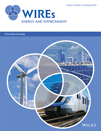
Wiley Interdisciplinary Reviews-Energy and Environment
Shaping the dialogue on energy and environment.Wiley Interdisciplinary Reviews: Energy and Environment, published by Wiley Periodicals, Inc., stands as a leading platform for interdisciplinary research at the intersection of energy and environmental sciences. With a commendable impact factor and prestigious rankings—Q1 in both Environmental Science and Renewable Energy, Sustainability and the Environment—the journal has solidified its position in the academic community, ranked #22 out of 233 in General Environmental Science and #46 out of 270 in Renewable Energy. This journal aims to advance understanding and foster innovative solutions to pressing global challenges such as climate change, energy efficiency, and sustainability issues. Researchers and professionals alike are encouraged to explore the journal’s extensive range of articles, which contribute to a significant body of knowledge and support informed decision-making in policy and practice. Please note that the journal is not open access, providing content through institutional subscriptions and individual purchase options. Operating from its base in the United Kingdom, the journal maintains an impressive convergence of knowledge from 2012 to 2024, encouraging contributions from a diverse range of disciplines to address critical energy and environmental challenges.
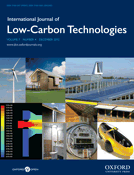
International Journal of Low-Carbon Technologies
Empowering the quest for sustainable practices.International Journal of Low-Carbon Technologies is a premier, peer-reviewed publication dedicated to advancing the field of low-carbon technologies and sustainable practices. Published by OXFORD UNIVERSITY PRESS, this journal serves as a vital resource for researchers, professionals, and students alike, providing insightful research and innovative solutions for a sustainable future. With its ISSN 1748-1317 and E-ISSN 1748-1325, the journal is recognized globally, boasting an impressive impact in its categories, including a Q1 ranking in Architecture and Q2 rankings in both Civil and Structural Engineering and Environmental Science as of 2023. It is open access since 2014, facilitating the dissemination of knowledge to a wider audience, and encourages critical discourse on environmental sustainability across converging disciplines. The journal’s Scopus rankings reflecting its standing—ranked #23 in Architecture (88th percentile) and #130 in Civil and Structural Engineering—underscore its importance in driving forward the scientific agenda in low-carbon technologies. As we journey from 2007 towards 2024, the International Journal of Low-Carbon Technologies remains a cornerstone for research and dialogue in reducing carbon footprints and promoting resilient infrastructure.
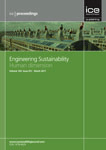
Proceedings of the Institution of Civil Engineers-Engineering Sustainability
Bridging Engineering and Environmental StewardshipProceedings of the Institution of Civil Engineers - Engineering Sustainability is a distinguished journal published by Emerald Group Publishing Ltd, focusing on the intersection of civil engineering and sustainability practices. As a Q3 category journal in the field of Civil and Structural Engineering, it offers a critical platform for professionals, researchers, and students to share innovative research that addresses global environmental challenges from 2004 to its forthcoming issues in 2024. With an ISSN of 1478-4629 and E-ISSN of 1751-7680, this journal aims to disseminate vital knowledge regarding sustainable engineering solutions and practices, thereby fostering awareness and prompting action within the discipline. Although not an Open Access journal, it maintains a strong connection to academic and practitioner communities, ensuring high visibility and accessibility through its rigorous peer-review process. Its current Scopus rank places it in the 58th percentile, underscoring its relevance and contribution to the civil engineering domain.
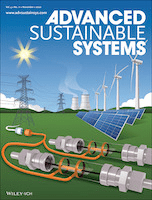
Advanced Sustainable Systems
Pioneering Research for a Sustainable FutureAdvanced Sustainable Systems is a premier academic journal published by WILEY-V C H VERLAG GMBH, dedicated to the dynamic fields of environmental science and renewable energy. With an ISSN of 2366-7486, this journal has rapidly established its significance within the scientific community, achieving a prestigious Q1 ranking in both Environmental Science (miscellaneous) and Renewable Energy, Sustainability and the Environment categories as of 2023. Spanning the converged years from 2017 to 2024, it serves as a vital platform for researchers and practitioners alike, facilitating the dissemination of innovative ideas and groundbreaking research that drive sustainability initiatives globally. Although not an Open Access publication, its contributions are invaluable, reflected by its commendable Scopus rankings—#28 out of 233 in General Environmental Science and #49 out of 270 in Renewable Energy. As we face pressing environmental challenges, Advanced Sustainable Systems remains at the forefront, championing research that informs and influences sustainable practices and policies across the globe.

Environmental Engineering and Management Journal
Pioneering research at the intersection of engineering and ecology.Welcome to the Environmental Engineering and Management Journal, a pivotal platform for disseminating knowledge and innovative research in the fields of Environmental Engineering, Management, Monitoring, Policy, and Law. Published by GH Asachi Technical University of Iasi in Romania, this journal has been committed to fostering discussions and advancements in environmental solutions since its inception in 1988, with continuous publication from 2002 to 2024. While classified in the Q4 category across various environmental disciplines in 2023, it remains an important resource for scholars and practitioners navigating the complexities of pollution and environmental management. With an ISSN of 1582-9596 and an E-ISSN of 1843-3707, this journal encourages submissions that address pressing ecological challenges and provide actionable insights. Although currently not open access, it seeks to expand its reach and relevance within the global academic community. Join us as we explore critical environmental issues and contribute to sustainable practices worldwide.

Clean Technologies and Environmental Policy
Pioneering research for a sustainable future.Clean Technologies and Environmental Policy is a prestigious journal published by Springer, dedicated to advancing the field of environmental science through the lens of sustainable technology and policy-making. Since its inception in 2004, the journal has carved out a significant niche within the academic community, boasting an impressive impact factor reflective of its quality, as evidenced by its ranking in the Q1 and Q2 categories across various disciplines, including Environmental Engineering and Business, Management and Accounting. With a focus on innovative approaches to managing environmental challenges, the journal covers a wide array of topics from management strategies in environmental engineering to methodologies in policy development. This comprehensive scope positions it as an essential resource for researchers, professionals, and students seeking to contribute to the dialogue on sustainable development and environmental stewardship. Although it operates without Open Access, the journal ensures rigorous peer review and timely publication of high-quality research, facilitating the dissemination of knowledge necessary for informed decision-making in the ever-evolving field of environmental science.
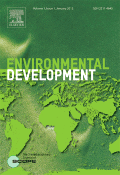
Environmental Development
Leading the charge in transformative environmental research.Environmental Development is a premier academic journal published by Elsevier, dedicated to advancing the field of environmental science through interdisciplinary research and innovative practices. With a focus on geography, planning, and development, as well as management, monitoring, policy, and law, this journal provides a rigorous platform for scholars and practitioners to share insights that shape sustainable environmental policy and practice. Holding a prestigious Q1 ranking in both relevant categories and boasting impressive Scopus rankings - 62 out of 821 in Geography and 60 out of 399 in Environmental Science - Environmental Development stands out as a critical resource for those invested in the future of our planet. The journal emphasizes impactful research that addresses contemporary challenges, fostering dialogue across disciplines and geographical boundaries. With a commitment to high-quality research, it offers an important outlet for those aiming to influence environmental policy and developmental strategies globally. Join the growing community of researchers, professionals, and students engaged in promoting sustainable environmental practices through the knowledge shared in this esteemed publication.
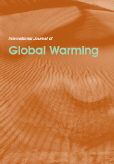
International Journal of Global Warming
Shaping Environmental Policy through Scholarly InsightWelcome to the International Journal of Global Warming, a pioneering publication dedicated to advancing knowledge in the crucial fields of global warming, climate change, and environmental policy. Published by INDERSCIENCE ENTERPRISES LTD, this journal serves as an essential platform for interdisciplinary research, examining the multifaceted impacts of global temperature rises on our planet. Since its inception in 2009 and continuing through to 2024, the journal has fostered a vibrant scholarly community, despite currently being indexed in the Q4 quartile for Atmospheric Science and Global and Planetary Change. The journal's unique focus allows researchers, professionals, and students to engage with critical data and innovative methodologies in environmental management, monitoring, and legal policy responses. Submissions are invited from scholars worldwide, though the journal is not open access, ensuring a selective and quality-driven publication process. Beyond its academic contributions, the International Journal of Global Warming plays a significant role in shaping discussions about climate resilience and sustainability practices, making it a vital resource in today's pressing environmental discourse.